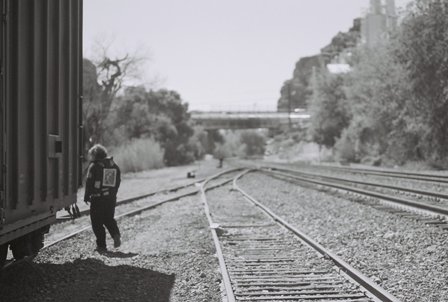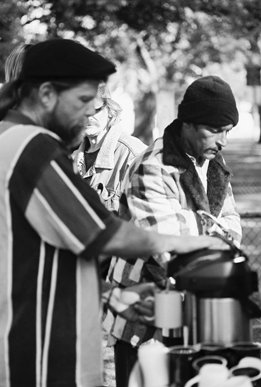By CJ Speelman
Continued from My House is Empty, Pt. 1:
 That night, as I tossed and turned in my own clean bed, wrapped in sheets with a fan keeping me cool, Linda haunted my thoughts.
That night, as I tossed and turned in my own clean bed, wrapped in sheets with a fan keeping me cool, Linda haunted my thoughts.
Her hollow, encrusted eyes pierced my conscience, her small, gurgling voice kept saying thank you. I wrestled with myself; I tore myself to pieces over my insensitivity earlier:
Why didnt I stop what I was doing to show this woman love, why didnt I hold her hand and sit and talk with her?
Through this painful struggle, I realized that I was Linda. All of my pretend righteousness that I conjured up like a facade, like a beautiful gown, was really just an old faded summer dress, barely reaching my knees. It is so easy to create a beautiful picture of yourself when you are helping the poor and the homeless. It is easy to look on those who ignore the poor and the oppressed with disdain. I was full of pride.
The interesting thing about pride is that it separates you from other people. I had cut myself off from everyone, not just those who were driving by the park trying to get through Old Town as quickly as possible, but also from my community and more importantly people like Linda. Pride was burning my face, just like Lindas face had been burned, and inevitably my pride would leave a scar.
I have often wondered how people like Mother Teresa could say they saw the face of Jesus in the faces of the poor. I have never really understood that mystery even though I have talked about it often and pretended I knew. All I saw was another person, someone who needed love, someone who was probably dirty, someone who was usually missing teeth or had drug problems. I looked at them through my own eyes, not through the eyes of Jesus. I realized that I needed to come to terms with my own poverty so that I could love the poor as Jesus asks me too. 
Jean Vanier, who is one of my inspirations and a pioneer of the Larche Communities that serve the disabled and poor throughout the world, speaks so eloquently of this paradox that I am speaking of in his book From Brokenness to Community:
The love and support of community gives you the certitude you are loved just as you are, with all your wounds, and that you can grow through all that. People may come to our communities because they want to serve the poor; they will only stay once they have discovered that they themselves are the poor. And then they discover something extraordinary: that Jesus came to bring the good news to the poor, not to those who serve the poor! I think we can only truly experience the presence of God, meet Jesus, receive the good news, in and through our own poverty, because the kingdom of God belongs to the poor, the poor in spirit, the poor who are crying out for love (p. 20).
We cannot find community through our own pursuits; we must become broken, humble – the poor. There is a huge drawing towards community in our generation; we desire to live with others, to help people to be a part of something that is bigger than ourselves. Our pursuit of community will fail if we cannot grasp this simple yet radical concept. It is the most difficult task I have ever undertaken; yet, Jesus has promised me His Kingdom, and that is far more rewarding than any treasure of Babylon.
C.J. Speelman is a member of Parea Community in the High Desert of Southern California. His passion is to build the Kingdom of God among the poor and to be a revolutionary.
